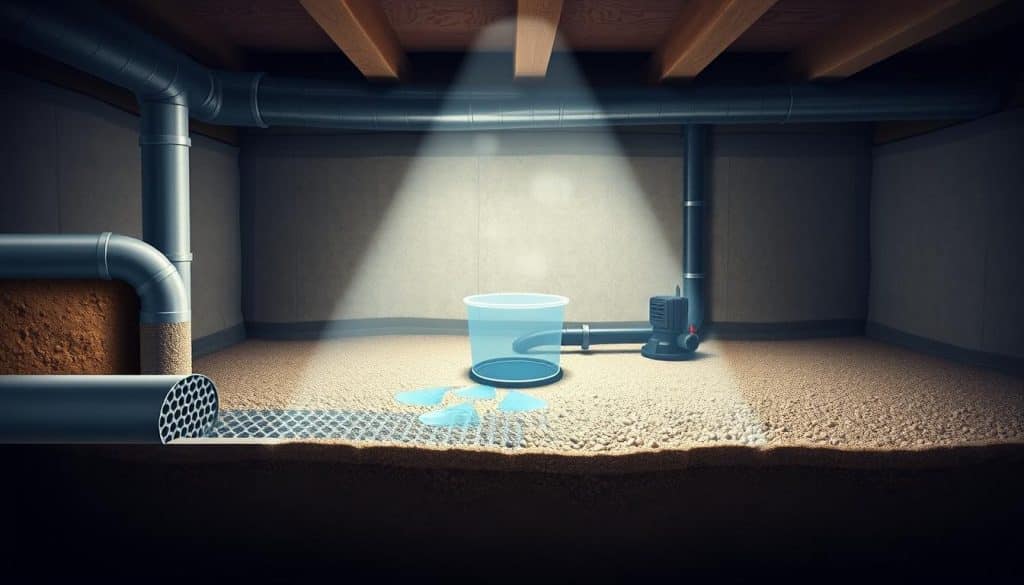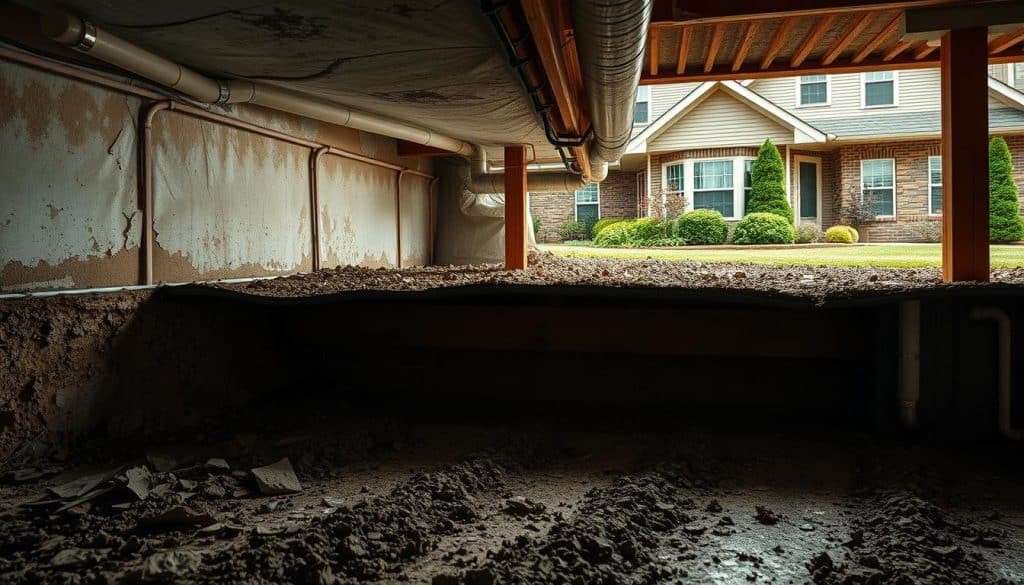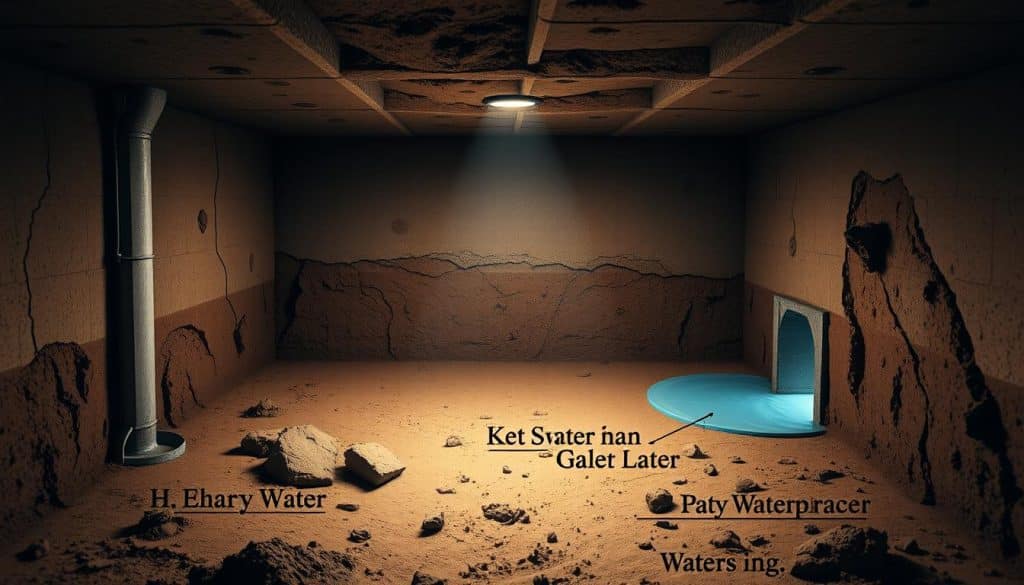Have you thought if Can Crawl Space Waterproofing Prevent Mold? or about the hidden dangers in your home’s foundation? Mold can grow in untreated crawl spaces, posing health risks and damaging your home. We’ll look into if crawl space waterproofing can stop mold. It’s not just about looks; mold can change your life.
With moisture in over 50% of homes with crawl spaces, can the right solutions keep your home safe? It’s a question many ask.
Key Takeaways
- Mold in untreated crawl spaces can affect approximately 25% of individuals exposed.
- Proper sealing of crawl spaces can reduce mold growth chances by up to 95%.
- Over 30% of homes may experience structural weakening due to untreated mold.
- Regular inspections can reduce the risk of mold by 40%.
- Nearly 70% of homes in humid climates face mold growth challenges.
Understanding Crawl Space Mold
Knowing why crawl space mold appears is key for homeowners. High humidity, water leaks, foundation cracks, and poor ventilation are common causes. These factors make a perfect setting for mold to grow.
When humidity goes over 60%, mold starts to spread. This can harm your health and damage your home.
What Causes Mold in Crawl Spaces?
Several things lead to mold in crawl spaces. Moisture from damp soil or water leaks is a big problem. Without good drainage, moisture gets in and mold grows.
Many homeowners struggle with mold if they don’t fix the moisture issue. Using encapsulation systems and waterproofing can help stop mold and mildew.
Signs of Mold Growth in Your Home
Spotting mold in crawl spaces is important. Look for musty smells, mold spots, and more pests. These signs mean mold might be there.
Also, if the air feels damp, it could be mold. Check your home every 6 to 12 months. Good airflow and a dehumidifier help keep mold away.
The Importance of Waterproofing
Crawl spaces need waterproofing to fight moisture, which causes mold. Waterproofing is key to keeping air clean and preventing damage. Let’s look at how it works and its many benefits.
How Waterproofing Works
Waterproofing creates barriers against moisture. A common method is using vapor barriers, thick plastic sheets on the ground. These stop water vapor from rising.
Drainage systems also play a big role. They move water away from the foundation. This helps control moisture in crawl spaces. Using these methods can greatly reduce mold and moisture problems.
Benefits of Crawl Space Waterproofing
Waterproofing crawl spaces has many benefits. It can lower indoor humidity by up to 20%, improving air quality. Without it, homes are 30% more likely to have mold, which can harm breathing.
It also prevents structural damage, which affects about 20% of homes. Waterproofing can save 15% to 25% on energy costs by improving insulation. It’s a smart investment, adding 10-15% to a home’s value in damp areas.
Drainage First: Our Philosophy
Fixing drainage problems before waterproofing is key to stopping mold in crawl spaces. Effective drainage tackles moisture issues at their source. This stops water from getting into crawl spaces, lowering mold risk.
Why Prioritize Drainage?
Water damage is a big worry for homeowners, affecting nearly 60% of U.S. homes. It can cause serious mold problems, which start quickly after water exposure. Fixing drainage first helps avoid mold and protects your home from water damage.
Cost-Effectiveness of Drainage Solutions
Drainage solutions are often cheaper than traditional waterproofing. Basement waterproofing can cost between $2,000 and $10,000. But, focusing on drainage can save money by avoiding mold and structural damage. This makes for a smart investment that boosts your home’s value.

Common Crawl Space Issues
Crawl spaces can harm the safety of homes. Moisture can cause mold, damage structures, and worsen air quality. It’s important to fix these problems quickly to keep homes safe and avoid expensive fixes.
Water Intrusion and Mold Growth
Water getting into crawl spaces is a big problem. About 25% of homes deal with moisture here, which helps mold grow. Water can come from the ground, leaks, or bad drainage.
Mold can start growing in just 24-48 hours after water shows up. Homes with moisture in crawl spaces are more likely to have flooring damage. Up to 70% of flooring problems are linked to moisture.
The Role of Humidity in Crawl Spaces
Humidity is key in crawl spaces. Levels above 50% are perfect for mold. Using a vapor barrier can cut humidity by up to 50%.
This helps prevent mold and improves air quality. Regular checks can catch moisture problems early. Neglecting these checks can lead to big moisture issues in five years.
Effective Waterproofing Solutions
Keeping your crawl space dry is key to preventing mold. Effective drainage systems help protect your home and improve air quality. French drain installation and catch basin systems are top choices. They move water away from your home, keeping it strong.
French Drains for Crawl Spaces
French drains use a trench with gravel and pipes to move water away. They’re great for areas with lots of rain and moisture. By stopping water from getting in, they lower humidity and prevent mold.
Studies show homes with French drains have less moisture. This makes for a healthier place to live.
Catch Basins and Drain Systems
Catch basin systems manage water runoff. They’re placed to catch water, stopping it from pooling near your foundation. With other solutions, they keep your home dry and safe.
Using these systems can save you money on repairs. It’s a smart investment for your home’s future.
Comparing Interior vs. Exterior Solutions
Homeowners often face a choice between interior and exterior waterproofing for crawl spaces. Each method has its own pros and cons, like how well it works and how long it lasts. Knowing the risks of interior drainage helps make better choices.
Risks of Interior Drain Systems
Interior drainage systems are cheaper and faster to set up. But, they have downsides. Water can get through foundation walls, causing humidity and mold. You need to check them every six months, which can cost more over time.
These systems don’t stop water pressure from outside. This pressure can damage your home badly.
Why We Advocate for Exterior Solutions
Exterior waterproofing tackles moisture at its source. It protects your home’s structure better than interior methods. It might cost more upfront because of digging and labor. But, exterior systems last longer.
For homes with serious moisture problems, exterior solutions are a strong choice. They help prevent mold for good.

Key Services Offered by Drainage First
Drainage First offers specialized services to fight water intrusion and protect your home. We focus on basement waterproofing, downspout drainage, and foundation repair. These services work together to keep your home safe from mold and structural damage.
Basement Waterproofing Overview
Basement waterproofing is key, as water damage can cause mold in many homes. Our services can cut mold risk by up to 80%, keeping your family healthy. A good system also keeps humidity levels down, saving you 15% to 25% on energy costs.
Also, homes with these services can see a 10% value increase. Plus, they come with transferable lifetime warranties.
Downspout Drainage Solutions
Our downspout drainage solutions keep water away from your foundation. It’s important to direct water at least 10 feet from your home. This helps prevent dampness in about 40% of basements, improving air quality and reducing musty smells.
Foundation Repair Insights
Foundation repair fixes damage from too much moisture. Water issues can cost from $1,000 to $5,000 for small problems. For bigger repairs, costs can go over $10,000.
Our foundation repair solutions help avoid these high costs. They also make your home’s structure stronger.
Maintaining a Mold-Free Environment
To keep your home mold-free, you need to stay active and watchful. Regular checks are key to spotting problems early. This is even more important in crawl spaces, where dampness can lead to mold.
Regular Inspections and Maintenance
Check your crawl space at least twice a year. These checks help find moisture and mold early. Wood moisture over 20% is a sign of mold risk.
Having a maintenance plan is smart. It includes checking humidity and making sure vapor barriers cover the soil. This helps prevent mold.
Role of Ventilation in Mold Prevention
Good ventilation fights humidity in crawl spaces, which is vital in humid areas. It keeps humidity below 50%, making it hard for mold to grow. Dehumidifiers help by lowering moisture, keeping your home mold-free.
These steps protect your health and your home’s structure. They are worth the investment.
How to Identify the Source of Water Entry
Finding where water gets into your home is key to avoiding damage and mold. A detailed check of your drainage system can show where moisture is getting in. Look for signs of poor drainage around your home to take action.
Assessing Your Home’s Drainage System
First, check how your yard slopes. It should slope away from your home’s base. Make sure gutters and downspouts are clear and water flows at least six feet from your foundation. A sump pump can help if water stays in your crawl space.
Signs of Poor Drainage Around Your Home
Watch for standing water or mildew smells in your crawl space. These are signs of too much moisture. Also, look for peeling paint, water stains, or color changes on walls. Knowing how to manage drainage is important to keep your home dry and safe.

Client Testimonials: Success Stories
Client testimonials show how well Drainage First’s waterproofing works. Many homes have fixed mold problems and stopped water damage. The positive feedback shows real changes and success stories.
Real Experiences with Drainage First
Drainage First reviews say 100% of clients are happy with the staff’s professionalism. People liked the friendly service and how quick it was. This shows why many recommend them for fixing water and mold issues.
Transformations After Waterproofing
Many clients saw big improvements after waterproofing. Some saw a 100% drop in moisture problems. One project used 42 helical anchors to strengthen the foundation.
People also liked how clean the work areas were after finishing. With Drainage First, you get a lifetime warranty. This shows their dedication to quality and lasting solutions.
Cost Considerations for Homeowners
Homeowners need to think about several things when looking at crawl space waterproofing. It’s important to know the costs to make smart choices that protect your home without breaking the bank. Luckily, there are affordable ways to keep moisture out and stop mold from growing, all while saving money.
Budget-Friendly Options for Waterproofing
The price for crawl space encapsulation can vary a lot. It can be anywhere from $1,500 to $15,000, with an average cost of $5,500. The cost of labor is usually 50% to 70% of the total, and materials make up the rest.
For those on a tight budget, there are options starting at $3 to $7 per square foot. This makes waterproofing more affordable. Smaller crawl spaces might cost around $5,000, while bigger ones could be more, up to $10,000 or more.
Long-Term Savings from Proper Drainage
Choosing the right drainage solutions can save you money in the long run. You could save about $30 a month on your energy bills, which adds up to $360 a year. Over 10 years, that’s $3,600 saved.
Good waterproofing also means less mold and fewer expensive repairs. It can cut your energy use by 10-20%. Plus, fixing moisture problems early can save you from spending $500 to $5,000 later. With the right steps, you can avoid moisture problems and save money for years to come.
Contact Drainage First for Your Needs
If you’re dealing with mold or moisture in your crawl space, it’s time to act. At Drainage First, we provide top-notch waterproofing services. We know that over 40% of American homes have damp crawl spaces.
This is why it’s important to tackle these problems early. Doing so prevents bigger structural issues and health risks.
How to Reach Us
Need help fast? Call Drainage First at (678) 389-9544. Our team is ready to assess your situation and offer solutions. We can help with vapor barriers, sump pumps, or improving drainage.
Reach out today for your waterproofing needs. Start protecting your home’s health with our help.
Don’t let mold or moisture harm your home. Contact Drainage First for a consultation. Our reliable services will keep your crawl space dry and safe for years.














